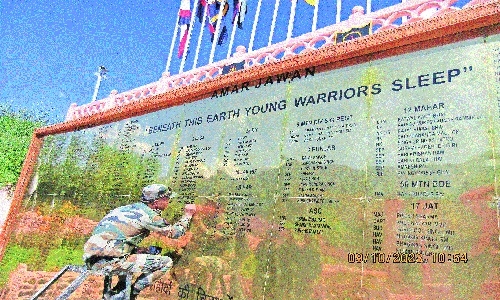Kargil: The point of paradigm shift
| Date :18-Nov-2023 |

From The Editor’s Desk
Twenty-five years ago, when India defended the Kargil heights from sly invaders from Pakistan in a serious conflict of both military and diplomatic nature, those who had an eye on the future knew even in those moments that the country stood on the door-step of a paradigm shift in its strategic thought-process. For, the counter-action by the Indian forces of defence and diplomacy did not just evict the Pakistani troops (in disguise or in uniform), but also laid the foundation of an entirely new approach to national security. The Indians might have looked that time as if they were caught unawares in Kargil, but factually, they were far more mentally and militarily ready to expect any such eventuality, given particularly the nasty character of Pakistan’s ambitious Army chief General Pervez Musharraf and the lame-duck Prime Minister Nawaz Sharif. The Indians might not have noticed quickly that the Pakistanis had occupied the Kargil heights. But once they did, their response was absolutely professional -- in tune with the great reputation of the famed Indian Armed Forces. What followed was a fierce conflict -- which many loved to call a mini-war -- in a never-before partnership with the diplomatic corps that finally established India’s superiority over Pakistan in a no-nonsense manner. The Kargil conflict also earned for India a tremendously positive international image and patronage of powers that be.
It was not without reason, therefore, that Pakistan Prime Minister Benazir Bhutto admitted -- howsoever reluctantly -- that “Kargil was the biggest blunder committed in the history of Pakistan”. As he recalls this famous quote, General Ved Prakash Malik (Retired), the Chief of Indian Army during the Kargil conflict, in a detailed study for the Gyan Chakra Think Tank (2023 -- A Western Command Initiative), makes a clear analysis of how quickly India learned its lessons at Kargil. As ‘The Hitavada’ concludes its 12-part, elaborate reportage of the Kargil as a detailed historical perspective by Chief Reporter Kartik Lokhande, it urges readers to understand that from that time a quarter of a century ago, a doctrinal change came in India’s security and strategic thinking. Almost on a yearly basis since 1999 when the Kargil conflict took place and gave India a hard-earned but well-deserved victory, the country’s political and military leadership has kept fine-tuning its strategic approach so that it is ready for any eventuality with a real-time, split-second response.
As he moved in the rugged terrain of Kargil and countered the rough weather and terrifying heights for over a week, Kartik Lokhande dug into small details that actually showed the early sluggishness of the Indian system as well as the subsequent maturity with which India responded to the challenge in Kargil. No doubt, 25 years ago, Kargil was a challenge very wonderfully handled by Prime Minister Atal Behari Vajpayee. Not only was he smart in diplomacy but also tough in military decisions, giving his commanders full freedom to act professionally. In the ‘Dateline Kargil’ series, ‘The Hitavada’ revisited some seemingly small moments and details that actually defined a lot of developments during those challenging days 25 years ago. He returned with a firmer understanding that Kargil was a disguised blessing for India’s strategic thinking in the long distance. The Kargil reportage, thus, was an attempt by ‘The Hitavada’ to present a nuanced picture of what happened not just 25 years ago but also much earlier -- that is soon after Independence and how India took its own time really to snap itself to eternal alertness. The stories in the ‘Dateline Kargil’ series also showed how this travel from early indolence to later independence of thought-and-action eventually reshaped India’s strategic paradigm.
Just a couple of months ago, ‘The Hitavada’ had also done a similar coverage of the Khalistan issue in nuanced details, thereby presenting an altogether different picture of the anti-India movement (that also got an unfortunate support from some segments of the country’s political community). The effort, as is obvious, is to present to the larger community the larger picture of major issues that confront the nation from time to time. ‘The Hitavada’ takes this opportunity to thank the readers for their enthusiastic response to our effort. As the nation prepares to celebrate the Silver Jubilee of Kargil Vijay Diwas on July 26 next year, ‘The Hitavada’ pays sincere tributes to the legendary Indian Armed Forces and India’s political leadership and strategic response to the challenges.